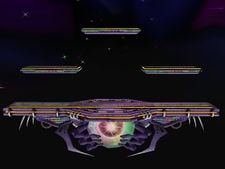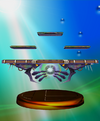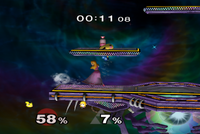Battlefield (SSBM)
| Special Stage Battlefield | |
|---|---|
  Battlefield in Super Smash Bros. Melee. | |
| Universe | Super Smash Bros. |
| Appears in | Melee |
| Availability | Unlockable |
| Unlock criteria | Clear All-Star Mode on any difficulty with any character. |
Battlefield (戦場, Battlefield) is a special stage in Super Smash Bros. Melee.
Several battles in single-player modes are fought here:
- the tenth round of Classic Mode, against a randomly selected metal character (with the exception of Ganondorf, Mr. Game & Watch, and Roy).
- the eleventh round of Adventure Mode, against the Fighting Wire Frames, Metal Mario, and Metal Luigi.
- the battle against Mewtwo in All-Star Mode
- every Multi-Man Melee mode
- in Classic Mode, the player may be able to fight Bowser on this stage before the metal fight; his possible allies in the team battle while being fought on this stage include Zelda, Mewtwo, Peach, and Mario.
Falco is fought here in his unlock battle.
Stage overview
Battlefield's main platform is flat, just like Final Destination, but not as long. Three smaller platforms are suspended in a pyramid pattern above the main platform. It shares cosmetic similarities to Final Destination in that the background is abstract and changes shape and color constantly.
Edges
In competitive play, Battlefield is infamous for its very thin edges. Recovery on this stage is considered difficult for many characters: it is easy to miss the edge with a vertically aimed up special move, causing the player to end up stuck underneath the stage for a likely KO. It is more difficult to sweet spot the edge using characters such as Marth and Fox on this stage compared to other similar stages. There is one exception to this: with Falco (and with Fox with more difficulty), it is possible to edge cancel Falco Phantasm/Fox Illusion on one of the bottom platforms. Then, the player can choose to immediately phantasm to the next platform, which also edge cancels.
Battlefield's edges are alleged to be "glitchy". The angled walls connected to the ledges make it possible for a character to slip underneath the ledge, before their ledge grab box enters the range that allows for ledge grab, which makes the ledge grab fail. For example, it is possible for Peach to float toward the edge at the correct height to grab it, but move too close, with her ending up below the edge, which leads to her plummeting to death after her float ends. Because in Melee it is impossible for a character to grab an edge, if their central edge grab box divider intersects the edge or floor besides it. Or in other words, as that divider is always inline with the characters position, the character has to be beside the edge horizontally to be able to grab it.
The Battlefield's edges also make so called "magic pixel" recovery possible, where some characters will auto-sweetspot the ledge while moving upwards, similar to the default mechanic in future games. This may happen when a recovering character moves very closeby the point that connects the wall and the ceiling underneath one of the ledges, with circumstances lining up well. It's possible, because from collision standpoint, ceilings extend slightly beyond their end points. If a character hits that roughly 1 unit wide extension (1 SDI input results in max 6 units movement for reference) of the ceiling below ledge, they can also collide with the wall above it simultaneously. Then, the wall collision can push them enough outward to get them beside the ledge horizontally, while the ceiling collision may push them downward, to allow ledge grab. For all of that to result in a "magic pixel" ledge grab, it's not enough to angle ones recovery move precisely to hit the tiny ceiling extension (i.e. the "magic pixel"). In addition one has to space the recovery such that they're very close to the ceiling before the collision happens, and they have to have the top of their collision box extend upwards when the collision happens, such that the ceiling collision actually results in downward movement. And they also have to have wide enough collision box and enough upwards speed, such that the wall collision pushes them enough outward from below the ledge. And, of course, their ledge grab box also has to reach to the edge. Due to the precise conditions and the risk involved, "magic pixel" ledge grabs occur very rarely.[1]
A technique unique to Mewtwo where, due to the thinness of the edges, can use Confusion to pull its opponent through the floor by the ledge leading to gimps on opponents with bad recoveries.
Tournament legality
Because of its simple layout, Battlefield has been a tournament legal stage throughout all of Melee's tournament history, outside of Final Destination-only tournaments held early in the game's life. It is often considered the most neutral stage by professionals, as its geometry and platform layout do not give many significant matchup-specific advantages in the majority of singles matches, though its ledges can be problematic. As such, in tournament play, Battlefield is often the first stage that two players strike to.
Trophy
The Battlefield trophy is unlocked alongside the stage itself by clearing All-Star Mode with any character on any difficulty.

- Battlefield
- Super Smash Bros. Melee borrows settings from many different games to create its stages, but the Battlefield is an original creation. While its initial impression may strike some players as a bit ominous, the layout itself is fairly standard, lending it to serious, straightforward matches. Additionally, it's used to pit players against the Fighting Wire Frames.
- Super Smash Bros. Melee (12/01)
Gallery
Names in other languages
| Language | Name | Meaning |
|---|---|---|
| 戦場 | Battlefield | |
| Battlefield | — | |
| Champ de Bataille | Battlefield | |
| Battlefield | — | |
| Campo de batalla | Battlefield |
Trivia
- When Battlefield is played on in Classic, Adventure, and All-Star Modes, as well as Event Matches Space Travelers and Mewtwo Strikes!, it has a circular swirling rainbow design in the background. This background does not appear when the stage is selected normally in Versus Mode, and is otherwise unavailable. However, it is available through hacking.
- Gravity is lowered significantly on this stage in the Adventure Mode fight against the Fighting Wire Frames.
- Unlike its counterparts in the other Smash games, this Battlefield uses a series symbol that is exclusive to itself. However, it is still considered part of the Super Smash Bros. universe.
- In Super Smash Bros. for Wii U, when a player battles Master Core, its final form resembles that of the orb below this stage.
References
| Stages in Super Smash Bros. Melee | |
|---|---|
| Starter stages | Brinstar · Corneria · Fountain of Dreams · Great Bay · Green Greens · Icicle Mountain · Jungle Japes · Kongo Jungle · Mushroom Kingdom · Mute City · Onett · Pokémon Stadium · Princess Peach's Castle · Rainbow Cruise · Temple · Venom · Yoshi's Island · Yoshi's Story |
| Unlockable stages | Battlefield · Big Blue · Brinstar Depths · Final Destination · Flat Zone · Fourside · Mushroom Kingdom II · Poké Floats |
| Dream Land · Kongo Jungle · Yoshi's Island | |




